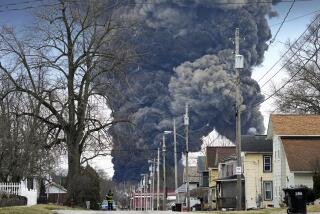White House defends response to Ohio toxic train derailment

WASHINGTON — The Biden administration on Friday defended its response to a toxic freight train derailment in Ohio two weeks ago, even as local leaders and members of Congress demanded that more be done.
The Feb. 3 derailment in East Palestine, Ohio, left toxic chemicals spilled or burned off, prompting evacuations and fears of contamination by wary residents distrustful of the state and federal response.
The White House said it has “mobilized a robust, multi-agency effort to support the people of East Palestine, Ohio,” and noted that officials from the Environmental Protection Agency, National Transportation Safety Board and other agencies were at the rural site near the Pennsylvania line within hours of the derailment of the Norfolk Southern train carrying vinyl chloride and other toxic substances.
“When these incidents happen, you need to let the emergency response take place,’’ White House Press Secretary Karine Jean-Pierre said Friday. “We did take action and folks were on the ground.’’
EPA Administrator Michael S. Regan visited the site Thursday, walking along a creek that still reeks of chemicals as he sought to reassure skeptical residents that the water is fit for drinking and the air safe to breathe.
“I’m asking they trust the government,” Regan said. “I know that’s hard. We know there’s a lack of trust.” Officials are “testing for everything that was on that train,” he said.
No other Cabinet member has visited the rural village, where about 5,000 people live, including many who were evacuated as crews conducted a controlled burn of toxic chemicals from five derailed tanker cars that were in danger of exploding.
Administration officials said their response has been immediate and effective.
“We’ve been on the ground since Feb. 4 ... and we are committed to supporting the people of East Palestine every step of the way,” Jean-Pierre said.
Transportation Secretary Pete Buttigieg, who has faced criticism from lawmakers and the mayor of East Palestine for not visiting the site, said the Ohio disaster was just one of many derailments that occur each year. A train hauling hazardous materials derailed Thursday near Detroit, but none spilled, officials said.
“There’s clearly more that needs to be done, because while this horrible situation has gotten a particularly high amount of attention, there are roughly 1,000 cases a year of a train derailment,’’ Buttigieg told Yahoo Finance.
He tweeted Friday that his department “will hold Norfolk Southern accountable for any safety violations found to have contributed to the disaster” and will be guided by the findings of the National Transportation Safety Board’s independent investigation.
President Biden has offered federal assistance to Ohio Gov. Mike DeWine and Pennsylvania Gov. Josh Shapiro, and the Federal Emergency Management Agency has been coordinating with the state emergency operations center and other partners, the White House said.
In response to a request from DeWine and Ohio’s congressional delegation, the Health and Human Services Department and Centers for Disease Control and Prevention are sending a team of medical personnel and toxicologists to Ohio to conduct public health testing and assessments.
The team will support federal, state and local officials already on the scene to evaluate people who were exposed or potentially exposed to chemicals, officials said.
Since the derailment, residents have complained about headaches and irritated eyes and finding their cars and lawns covered in soot. The hazardous chemicals that spilled from the train killed thousands of fish, and residents have talked about finding dying or sick pets and wildlife.
Residents also are frustrated by what they say is incomplete and vague information about the lasting effects from the disaster, which prompted evacuations.
Regan said Thursday that anyone who is fearful of being in their home should seek testing from the government.
“People have been unnerved,” he said. “They’ve been asked to leave their homes.” He said that if he lived there, he would be willing to move his family back into the area as long as testing shows it’s safe.
Sen. Joe Manchin III (D-W.Va.) said he was glad that Regan visited the site, but called it “unacceptable that it took nearly two weeks for a senior administration official to show up’’ in Ohio.
Sen. Sherrod Brown (D-Ohio), who toured the crash site with Regan on Thursday, said he spoke with Biden on Friday and was assured that any assistance the state needs will be given.
“The president is all-in on getting FEMA” to provide direct assistance and is “all-in on holding Norfolk Southern accountable,” Brown said in an online news conference.
Ohio state Sen. Michael Rulli, a Republican whose district includes East Palestine, said Buttigieg should resign over what he called the Transportation Department’s inaction. “He has not even come close to being near ground zero and he should be ashamed,” Rulli said.
U.S. Rep. Bill Johnson (R-Ohio), who toured the site with Regan and Brown on Thursday, has generally supported the federal response but joined other Ohio officials in calling for more help from FEMA. Johnson sent a letter Friday asking the EPA to provide detailed information about the derailment, including the controlled burn conducted last week and testing plans for air and water quality.
“The community must be able to trust their air, water and soil is not a threat to their health following this train derailment,” Johnson said.
David Masur, executive director of the advocacy group PennEnvironment, said there’s been a “breach of public trust” in the wake of the disaster stemming from lax oversight of freight rail and weak notification requirements for hazardous cargo, as well as lingering uncertainties about air and water quality and whether evacuated residents were allowed to return home too soon.
“Because there have been so many missteps, you can understand that the public is skeptical,’’ said Masur, who co-wrote a report that detailed risks that trains carrying explosive and toxic materials pose to nearby communities. The report came after a 2015 CSX oil train disaster near Mount Carbon, W.Va. A train derailed, exploded and burned for days, contaminating the Kanawha River.
While Regan’s visit was helpful, he said, officials need to offer more than words or sympathy, and instead implement policies to protect the public health and prevent this from happening again.
Associated Press writer Patrick Orsagos in East Palestine, Ohio, contributed to this report.
More to Read
Sign up for Essential California
The most important California stories and recommendations in your inbox every morning.
You may occasionally receive promotional content from the Los Angeles Times.










